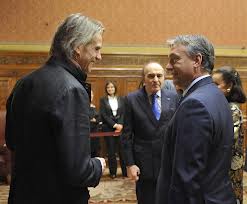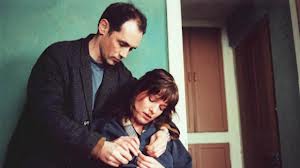"In the Mood
for Love"
Wong Kar Wai
The spectator's
idea of High Love, all over the world, has been insulted, lately, by of sorts of
"Reality shows".
The discourse of this type of television is
idiotistic and frustrating.
It evolves around boys and girls barely wearing
any underwear, walking uncombed between
bedrooms and bathrooms, having sex or pretending to, among faked furniture and
probably in the smell of perspiration...
The result: characters and spectators are
deprived of full moon summer nights, of exotic perfumes, of priestesses in long
silk gowns that have provoked, or at least suggested, so many delicious sins!...
If Cinema didn't
exist, if a chinese movie didn't come by every now and then, if television was
our only master of life, we would become a world of impotents, with slothful
and inhibited sexual practices!
Perfect behavour for the confessional, but deadly for
those determined to dream at the troubles, the longing, the madness of Love!
There are though films like
Wong Kar Wai's : "In the Mood for
Love". A movie that should be
screened in high and elementary schools as a secure remedy against the horror beyond human of commercial television...
The characters of
this surprisingly asian movie seem pure products of the celluloid, artificial
and stylized.
Until the second when we find ourselves burnt by their untamed
passion...
Of an almost physical
beauty and deep sadness, this film is the story of a crossed betrayal,
happening in the Hong Kong of the 60ies.
The main characters are both married
and neighbors. They both suffer from their legal half' absence, until they
uncover their unfaithfulness.
Follows a movie built on a refined "pas de
deux" where self-imposed restriction
fills up each scene in an almost claustrophobic manner.
 Here is a woman of
great beauty, in each moment of her life. She appears, in her eyes and in the
others', in the sophisticated simplicity of several chinese dresses, adherent
and monastic with their high necks, with
small openings just exact for her small and feminine steps.
Here is a woman of
great beauty, in each moment of her life. She appears, in her eyes and in the
others', in the sophisticated simplicity of several chinese dresses, adherent
and monastic with their high necks, with
small openings just exact for her small and feminine steps.
But it is precisely the
chastity of this posture that pulses a maximized attraction.
Maggie Cheung has
long legs. She walks like an egret on her high heels which fatally contract her
ankles.
Fatally, like a call for help.
She never laughs, she speaks minimally,
she generates renunciation, compassion and passion...
Her sanctuary is, like in
a "mise en abime", the cinema theatre...
The companion of
her drama is a gentleman of a gracious fragility, may be with the most sensual
nape ever seen in Cinema.
He is a sad and painfull figure, prisoner of who knows
what...
He is Tony Leung- the Prize for the Best Actor at Cannes.
These two noble
creatures evolve in a wretched Hong Kong, under the desolating, but vivid gray
of the rain (that the anemic people of the reality shows can't even
suppose), in tiny offices.
They live next to each other in two archaic
mini-apartments, certainly less horrendous than the atoned rooms of the reality
tv transmissions...
They meet by chance, here and there, and they want to meet
again, without ever mentioning it other than by their looks.
They become
closer, living with the fear of having their relationship discovered by the
landlady.
The virtuoso
director retains, though, any impulse between the two, in order to further
analyze the mechanics of desire, of loss and of regret, with an almost theological seriousness...
The artist
isolates their bodies by precise camera movements, by hand gestures, surrounding them with the
smoke curls of endless cigarettes.
Wong narrows the space repeatedly, as a
perfect representation of their such unusual relationship.
The film is a chamber piece of work.
It is built like a visual texture.
Velvety dark
tone, nuances of crystal or deep red, fluffy blue...
The camera
swallows with one look the small rooms where the characters move.
One minute
later we become amazed of how well a pulled curtain becomes the bysector of our
look.
It is a narcotic and tactile world, where even the wallpaper breaths...
The omnipresent
rain, the dark interiors of cabs, the illiberal spaces where they live, only
emphasize their need of love and the frustration of living in unfulfilling
couples.
This is the solitude and the darkness of "the mood of love"
that Wong Kar Wai wanted to create.
Christopher Doyle’s
and Mark Lin Ping’s images evolve like a dance, like a revery, opposing their
physical bodies, like a meditation on lust and attraction.
Maggie Cheung is angular
and metallic in the restriction of her costumes of a typical middle class wife
in the sixties' Hong Kong.
Leung is invested by the camera with a
liquid sensuality and an immaculate beauty.
Between the two grows an amorous tension,
never expressed, a wish that cannot or does not want to be achieved.
Mister
Chow will discover he has talent for drawing comics, having Misses Li-Zhen as
his muse.
Together they start to create, but also to masochistically rehearse
their future.
The rehearsal scenes are extremely painful: Li-Zhen faces the
adultery of her husband, and she concludes with an apparently wise(?) phrase:
"We shall not be like them"...
"In the Mood for Love" is also a
fragranced movie. Not only by the noodles and chinese dumplings which abound, but
also by the smell of clothes drying, after having been caught by rain...
We do not know if
they end by making love...
Everyone could bid for the conclusion they wish for:
repudiation, or fusion.
By the end of the film
we expect the two melancholiacs to consume their love in a very cinematic manner...
At the climax of their
passion, we only see two hands barely touching, filled with desire, but also
with renunciation...
But hasn't always High Love been that way?
by Giulia Ghica Dobre







































